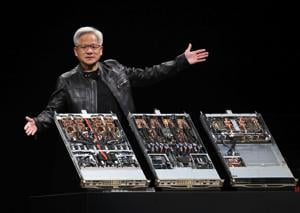Nvidia’s CEO, Jensen Huang, announced that the company has received approval from the Trump administration to resume sales of its advanced H20 computer chips to China. This pivotal development was shared in a company blog post on Monday and further elaborated during an interview with China’s state-run CGTN television network.
Huang stated, “The U.S. government has assured Nvidia that licenses will be granted, and Nvidia hopes to start deliveries soon.” He emphasized the importance of the Chinese market for American companies, noting that half of the world’s AI researchers are based in China. Huang expressed, “It’s so innovative and dynamic here in China that it’s really important that American companies are able to compete and serve the market here in China.”
This announcement comes as Huang is in Beijing for the China International Supply Chain Expo, where Nvidia is participating as an exhibitor. During his visit, he met with Ren Hongbin, the head of the China Council for Promotion of International Trade, highlighting the ongoing collaboration between the two nations in technology.
Nvidia has experienced substantial growth due to the rapid adoption of AI technologies, recently becoming the first company to surpass a market valuation of $4 trillion. However, the ongoing trade tensions between the United States and China have created challenges for the tech industry. The U.S. government has been tightening export controls on advanced technologies, citing concerns that technologies intended for civilian use could be repurposed for military applications.
The introduction of China’s DeepSeek AI chatbot in January raised additional concerns regarding the potential use of advanced chips in enhancing China’s AI capabilities. In early 2023, prior to the start of Trump’s second term, the Biden administration initiated a new export framework aimed at balancing national security with the economic interests of technology producers and their partners.
In April, the White House restricted sales of Nvidia’s H20 chips and AMD’s MI308 chips to China. Nvidia estimated that these tighter export controls could result in a loss of $5.5 billion in revenue. In response, Huang and other technology leaders have been advocating for a reversal of these restrictions, arguing that they limit U.S. competitiveness in a vital sector of one of the largest technology markets globally.
Following Huang’s announcement, Nvidia’s shares traded on U.S. markets surged nearly 5% before the opening bell, reflecting investor optimism regarding the renewed opportunity for sales in China. The shift in policy may provide a pathway for Nvidia to strengthen its position in the expanding AI landscape, while also addressing the complexities of international trade relations.
With Huang’s recent meetings with U.S. policymakers, the outcome of this renewed relationship between Nvidia and the Trump administration may reshape the dynamics of AI technology sales between the United States and China in the near future.





































































